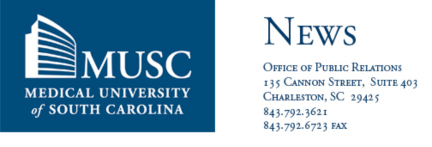
July 20, 2012
CHARLESTON -- Medical University of South Carolina (MUSC) is one of 26 academic institutions nationwide recruiting volunteers for a study on Resveratrol, examining its effects on those with mild to moderate dementia due to Alzheimer’s disease. Geriatric psychiatrist and researcher Jacobo Mintzer, M.D. will be the principal investigator for the MUSC study.
Resveratrol is a compound found in red grapes, red grape juice, red wine, chocolate, tomatoes and peanuts. Pre-clinical and pilot clinical research studies suggest that resveratrol may prevent diabetes, act as a natural cancer fighter, ward off cardiovascular disease, and prevent memory loss, but there has been no large definitive study of its effects in humans.
The risk of all of these diseases increases with aging. Animal studies suggest that resveratrol may impede molecular mechanisms of aging. Human population studies suggest several health benefits from modest daily consumption of red wine, but the mechanisms of action in the body are unknown.
“Although there have been possible health benefits of resveratrol, such as what is found in red wine or chocolate, researchers have suspected that this concentration may not be enough to produce clearly noticeable benefits in patients with Alzheimer’s disease,” says Mintzer. “Scientists have recently managed to isolate resveratrol and manufacture it in an easy-to-swallow pill form. This new development will allow us, for the first time, to adequately test the effects of resveratrol as a treatment for Alzheimer’s disease.” Mintzer concludes, “Although taking the pill may not be as fun as drinking wine or eating chocolate, the beneficial clinical results may end up being clearly evident.”
Resveratrol is not approved by the Food and Drug Administration for the treatment of Alzheimer’s. It is not known if resveratrol can change the course of the disease.
Not everyone who enrolls in the study will receive resveratrol. Half of the participants will receive a placebo (a sugar pill made to look like the resveratrol pill) to allow researchers to more objectively test the benefits of resveratrol. Neither the patient nor the clinical staff will know if the study participant is receiving the placebo or resveratrol until the end of the study. In addition, the phase II study will examine the safety and tolerability of resveratrol administered twice daily with a dose increase planned at three month intervals.
According to the National Institute of Aging, more than 5.3 million people in the U.S. are suffering from Alzheimer’s, and every 70 seconds, another person develops this disease.
The resveratrol study will be conducted at 26 U.S. academic institutions that are affiliated with the Alzheimer’s Disease Cooperative Study. Patients who volunteer for the study cannot be enrolled in another clinical trial during the study period. They will also be asked to abstain from eating or drinking large quantities of foods or beverages that contain resveratrol, and abstain from taking dietary supplements containing resveratrol.
The research is sponsored by the Alzheimer’s Disease Cooperative Study (ADCS), through a grant from the National Institute on Aging (NIA).
About MUSC
Founded in 1824 in Charleston, The Medical University of South Carolina is the oldest medical school in the South. Today, MUSC continues the tradition of excellence in education, research, and patient care. MUSC educates and trains more than 3,000 students and residents, and has nearly 13,000 employees, including approximately 1,500 faculty members. As the largest non-federal employer in Charleston, the university and its affiliates have collective annual budgets in excess of $1.7 billion. MUSC operates a 700-bed medical center, which includes a nationally recognized Children's Hospital, the Ashley River Tower (cardiovascular, digestive disease, and surgical oncology), and a leading Institute of Psychiatry. For more information on academic information or clinical services, visit www.musc.edu. For more information on hospital patient services, www.muschealth.com.
#####